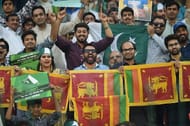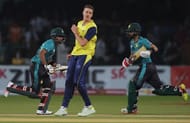
Mary Shelley in her pathbreaking novel Frankenstein had written, "Nothing is so painful to a human mind as a great and sudden change." Frankenstein had to pay with his loved ones for the creation he thought would change the world. If you look at Pakistan, the Frankenstein, if at all there was one, was always around, masqueraded in different forms, hidden under different veils. Its creation - the one that caused the change which has transcended generations now - is still around, and Frankeistan - if I dare say - has been trying everything under its prowess to undo the change.
"For me, my family comes first. Everyone gets a chance to make their own decisions. No one should be forced to do anything that they are not comfortable with. It was not an easy decision to make. It has to be respected."
You couldn't blame Nic Pothas for saying this. For all the talk of professionalism and team spirit, the irrevocable fact is that one's life remains sacrosanct and holds a higher priority than any other professional commitment. Pothas wasn't comfortable with travelling to Pakistan, nor were Upul Tharanga, Lasith Malinga, Niroshan Dickwella, Suranga Lakmal, Chamara Kapugedera, Milinda Siriwardene and Akila Dananjaya.
In addition to these seven, another 33 had written to the Sri Lankan board expressing their reluctance to travel to Pakistan. "It is a decision of the individual players in the Sri Lankan side. There has to be an open dialogue between the PCB, the Sri Lankan Cricket Board, the ICC and of course the Federation of International Cricketers’ Association (FICA)," Kumar Sangakkara, who was on that bus on that day, made his opinion felt.
"Once they have spoken to the ICC representative, and the representatives of all the organizations (the SLC, the PCB, and FICA), the players can have a clear idea about the security arrangement and the ground reality. They can make up their mind on whether to tour or not," he added.
The board, playing the diplomat as most boards do, declared that only those players who were willing to travel to Lahore for the final game of the three-match T20I series on October 29 would be picked in the squad.
The result? A new-look Sri Lankan side, led by Thisara Perera - who had the most recent experience of playing in Pakistan, with the World XI in the Independence Cup - played Pakistan in what was the first visit by a full member of the ICC since the dastardly attack on March 3, 2009.
In their capacity too, the who's who of the PCB have done everything to tell the world that Pakistan is safe for international cricket once again, but they would have known, in the hindsight, that it would be very easy for the world to look through the 'presidential-level security' and the pomp and show of a World XI.
"In my nine years of cricket, I have never seen that level of security. I think we can play again in Pakistan."
Perera's words would have been music to every Pakistani's ears and perhaps could convince fellow teammates Kapugedera and Lakmal, who were on that bus and were attacked on that fateful day, to visit Pakistan in the future. However, Perera's remarks after the Independence Cup couldn't gather much noise nor could they ruffle any feathers in the Sri Lankan camp.

"I was there in Lahore with the World XI last month and I was very impressed with the security that was given to the players. We were given security that is given to a Head of State. We were there for six days and were very impressed with the arrangements."
For once, if one believes in Najam Sethi's words of confidence, those which he tried to instill in the players touring from different nations and also those of Perera, one would think that such a high-level cricket extravaganza with almost the entire South Africa setup present on Pakistani soil could surely have convinced at least some of the top Sri Lankan cricketers to tour the country.
Hence, it could be reasoned that there were several other motivating factors for players to tour Pakistan aside from the greater cause of bringing cricket back to Pakistan. It was reported before the 1st T20I of the Independence Cup that players were being paid approximately $100,000 by the PCB for their services. Now, if this amount is compared to what Faf du Plessis earns (also an approximate amount, as reported in The Cricket Monthly magazine) through match fee and retainer contracts - $0.44M - one may reason that the incentive to play the series, apart from the goodwill, was good.
It can also be reasoned that du Plessis' South African teammates - Hashim Amla, Morne Morkel, and Imran Tahir - had an even greater incentive to play because these cricketers, most probably, do not earn as much as their captain does from international games. Also, with the exception of Tahir, none of them possess 'lucrative' T20 contracts.
Samuel Badree is a T20 freelancer and so is Darren Sammy, the latter doesn't feature in Windies' international plans anymore after a fallout with the WICB. Tim Paine, at the time of the series, didn't seem to be in contention for a spot in the Australian side and nor was Ben Cutting and George Bailey. England's Paul Collingwood and New Zealand's Grant Elliot had retired from international cricket.
So for most of these players, the World XI tour might have been a way to make financial gains, given that most cricket boards outside the Big Three don't pay their players as handsomely, and also, in Paine's case - who made a comeback to the Australian T20I side during the last leg of the team's limited-overs tour to India in October - to stake a claim in the national side.

The risk still seems too high - leveraging finances against one's life - but it can be reasoned that the incentives to play the series made the security issue fade away a little - which was also helped by the top-level arrangements made by the PCB.
For the lone T20I that Sri Lanka played, the incentives might not have been even remotely close. There was no promise of a $100,000 payout and there was, as always, a threat to their own safety. If the World XI tour would have been successful in changing the mindset of the global cricketing fraternity towards touring Pakistan - the financial incentives aside - we might have seen a Malinga or a Lakmal playing in Lahore. Unfortunately, that did not happen.
It was a Sri Lankan side, yes. A full member of the ICC, yes. But it was akin to the Indian side that plays Zimbabwe every year - devoid of top stars and there only under the India banner to try out future contenders. Windies are likely to tour for a full T20I series at the end of November, and one would think whether Chris Gayle or Carlos Brathwaite would have enough incentives to tour, given their own tussle with the board and the threat posed by T20 leagues, which they're already dealing with.
On that day in 2009, the Frankenstein in Pakistan finally gave birth to the creature that had been brewing in the pot for some time. The creature is still out in the open and has caused more bloodshed - the metaphorical one, for the actual bloodshed is too painful to discuss - than the PCB, the ICC or anyone can wipe off.
At the moment, we can take respite in the fact that international cricket - in some form, any form - is back in Pakistan. The question is how long will it take the cricketers to follow the cricket that's waiting for them at the Gaddafi Stadium.
Looking for fast live cricket scores? Download CricRocket and get fast score updates, top-notch commentary in-depth match stats & much more! 🚀☄️
